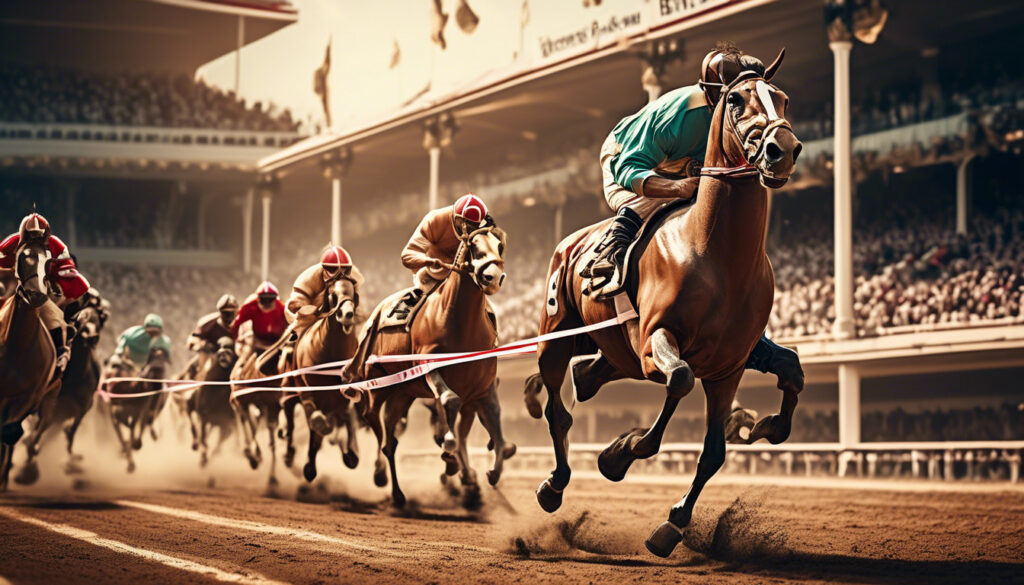As a society, we have always been captivated by the thrill of competition and the allure of chance. Our fascination with sports betting dates back centuries, intertwining our love for games with the excitement of wagering.
The origins of sports betting are as diverse and intricate as the cultures that embraced it. In ancient times:
- The Greeks placed bets on athletic events.
- The Romans wagered on chariot races and gladiatorial combat.
As we delve into the rich history of sports betting, we discover how it has evolved through the ages, adapting to societal changes and technological advancements.
From the bustling arenas of ancient civilizations to the digital platforms of today, our collective journey through sports betting is a testament to our enduring passion for both sport and speculation.
Together, let us explore when this captivating pastime began, tracing its roots and understanding how it has shaped—and been shaped by—our cultural and social landscapes.
Early Beginnings in Ancient Greece
In ancient Greece, sports betting emerged as a popular pastime during the Olympic Games. We can imagine the excitement and camaraderie among spectators as they placed wagers on their favorite athletes. This early chapter in sports betting history highlights how wagering became intertwined with the spirit of competition and community.
As we trace the evolution of wagering, it’s clear that the Greeks laid the groundwork for what would become a worldwide phenomenon. The thrill of predicting outcomes and sharing in collective hopes and fears brought people together, fostering a sense of belonging.
The legalization trends of such activities varied, but the societal acceptance in Greece set a precedent for future cultures. We can envision ourselves among those early bettors, feeling the pulse of the crowd, sharing victories or defeats.
This shared experience in ancient Greece not only entertained but also strengthened communal bonds. It illustrates how sports betting has always been more than a simple transaction—it’s a testament to human connection.
Roman Influence on Wagering
The Romans embraced and expanded the concept of sports betting, weaving it into the fabric of their grand spectacles and public arenas. The Colosseum, with its gladiatorial games, became a hub where our ancestors gathered, not just to witness the thrill of combat but also to engage in the excitement of placing bets.
This era marked a significant shift in wagering evolution. Betting on chariot races and other events allowed us to:
- Connect with others
- Share opinions
- Feel a sense of belonging
The Roman influence on wagering set the stage for future legalization trends, as the empire established guidelines and frameworks that resembled modern sports betting regulations.
By embracing sports betting, the Romans laid the groundwork for a tradition that transcended time. We continue to see their influence today, as the foundations they built still resonate within the global betting culture, binding us in shared enthusiasm.
Medieval Europe: The Rise of Bookmakers
During medieval Europe, bookmakers emerged as integral figures, shaping the landscape of sports betting by providing structured platforms for placing bets. This period marked a pivotal moment in sports betting history, as wagering evolved from informal, casual bets among friends to more organized and regulated activities. Communities began rallying around events, eager to engage in this thrilling pastime.
Bookmakers played a crucial role in our shared history by:
- Establishing rules and odds
- Offering bettors a sense of security and fairness
As a result, these bookmakers fostered a culture of trust and camaraderie that many of us still seek today.
The rise of bookmakers also laid the groundwork for future legalization trends in sports betting. By creating structured environments for wagering, they set precedents that would influence legal frameworks in the centuries to come.
Together, we can appreciate how this medieval evolution not only shaped entertainment but also wove a sense of belonging into the fabric of our communities.
Colonial America and Horse Racing
In Colonial America, horse racing quickly became a popular pastime, drawing communities together for both sport and betting excitement. These gatherings at racetracks provided not only the thrill of the race but also the chance to wager, bringing people closer. This era marked a significant chapter in sports betting history, as horse racing laid the groundwork for our collective wagering evolution. Betting was more than just a game; it was a social event that fostered a sense of belonging.
As we participated in these early forms of betting, we witnessed the beginnings of legalization trends that would eventually shape the future of sports wagering. Despite facing restrictions and moral debates, the lure of potential winnings kept us engaged.
Horse racing’s popularity demonstrated the unifying power of betting, paving the way for the diverse betting culture we know today. This shared experience brought thrill and camaraderie into our lives, highlighting the social and communal aspects of sports betting.
19th Century: Lotteries and Baseball
In the 19th century, lotteries and baseball betting became integral parts of American leisure and gambling culture. Together, they marked a significant chapter in sports betting history.
Lotteries were widespread, offering communities a sense of shared excitement and the hope of riches.
Meanwhile, baseball, America’s pastime, emerged as a popular target for wagers. We gathered at ballparks not just for the games but for the thrill of placing bets on our favorite teams and players.
This era witnessed the wagering evolution as both lotteries and baseball betting grew in popularity. They provided an early glimpse into the dynamics of sports betting, paving the way for future trends in legalization.
Although not yet fully regulated, such activities were a testament to our collective pursuit of entertainment and fortune. As communities, we found belonging in these shared experiences, laying the foundation for the complex betting landscapes we navigate today.
The 19th century was a pivotal period in shaping our gambling heritage.
20th Century: Legalization and Regulation
The 20th century ushered in a new era for sports betting, marked by significant strides toward legalization and regulation. This period was crucial in the history of sports betting, transforming it from underground activities to a more structured domain. Together, we navigated the complexities of legislation, yearning for an environment where sports enthusiasts could engage freely and responsibly.
In the early 1900s, the desire for regulated betting grew, and significant legalization trends began to take shape.
- Nevada led the charge in 1931, permitting gambling, including sports wagers.
- This move created a ripple effect that inspired other regions.
As we progressed into the mid-20th century, there was an increased emphasis on further regulation to curb illegal activities and embrace a more transparent wagering evolution.
Our collective efforts laid the groundwork for an industry that values integrity and fair play. This strengthened our bond as a community rooted in shared passion and purpose.
Technological Revolution: Online Betting
The internet’s rapid advancement has revolutionized sports betting, enabling us to place wagers online with unprecedented ease and accessibility. This transformation marks a significant chapter in sports betting history, as it shifts from traditional bookmakers to digital platforms that connect us all.
Online betting platforms have become an integral part of our lives, offering a shared community where we can engage and compete, no matter where we are. The wagering evolution we’ve witnessed is remarkable; it has democratized the betting process.
With just a few clicks, we can now explore a multitude of sports and markets, personalizing our betting experiences like never before. This sense of belonging to a global community is unparalleled, as we share insights and celebrate victories together.
Legalization trends have further fueled this growth, with more regions embracing and regulating online betting. This has provided a safer, more secure environment for us, ensuring that our passion for sports betting continues to thrive and evolve in exciting ways.
Modern Trends and Future Prospects
Today’s sports betting landscape is rapidly evolving, with emerging technologies and shifting regulations shaping its modern trends and future prospects.
Historical Context:As we delve into sports betting history, we see how far we’ve come in our wagering evolution. The legalization trends sweeping across nations highlight a growing acceptance and integration of sports betting into mainstream entertainment. More states and countries are embracing the potential economic benefits, which fosters a shared community experience among fans.
Technological Advancements:Our connection to sports betting is deepening with technology. Key advancements include:
- Real-time data and analytics that allow us to make more informed bets, enhancing our engagement and sense of community.
- Mobile apps and online platforms that have transformed how we participate, making betting more accessible and social.
Future Prospects:As we look to the future, the integration of artificial intelligence and virtual reality may redefine our experiences. This could offer:
- More immersive and personalized betting options.
- Seamless integration of sports betting into our social fabric.
Together, we’re embracing these changes, anticipating a future where sports betting continues to evolve and grow.
Conclusion
In conclusion, sports betting has a long and rich history that dates back to ancient civilizations.
From the early days of Greek competitions to the modern era of online betting, wagering on sports has evolved significantly.
As regulations continue to change and technology advances, the future of sports betting looks promising with new opportunities emerging for both bettors and the industry as a whole.

